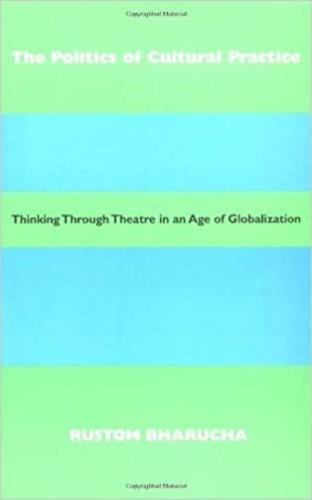Full Product Details
Author: Rustom Bharucha
Publisher: Wesleyan University Press
Imprint: Wesleyan University Press
Dimensions:
Width: 15.60cm
, Height: 1.60cm
, Length: 23.50cm
Weight: 0.340kg
ISBN: 9780819564245
ISBN 10: 0819564249
Pages: 203
Publication Date: 26 November 2000
Audience:
College/higher education
,
General/trade
,
Professional and scholarly
,
Undergraduate
,
General
Format: Paperback
Publisher's Status: Active
Availability: In Print

This item will be ordered in for you from one of our suppliers. Upon receipt, we will promptly dispatch it out to you. For in store availability, please contact us.
Reviews
Bharucha's well-written, thoughtful study . . . provides an insightful examination of the most pressing questions facing art and international society in the new millennium . . . an important study of the complex intersections of culture in which Bharucha connects the dramatic traditions of East and West . . . a significant work. Choice
Bharucha's well-written, thoughtful study . . . provides an insightful examination of the most pressing questions facing art and international society in the new millennium . . . an important study of the complex intersections of culture in which Bharucha connects the dramatic traditions of East and West . . . a significant work. Choice
A graceful and compelling study of how transnational and global forces operate. The postcolonial critique seems to emerge from the conditions, rather than to be imposed upon them. Bharucha's unique mix of personal anecdote and critical theory makes the theory readable and the example important. --Sue-Ellen Case, University of CaliforniaDavis A graceful and compelling study of how transnational and global forces operate. The postcolonial critique seems to emerge from the conditions, rather than to be imposed upon them. Bharucha's unique mix of personal anecdote and critical theory makes the theory readable and the example important. --Sue-Ellen Case, University of California, Davis Bharucha's critique of fundamentalism and globalisation employs theatre as the laboratory of inter- and intra-cultural practice. [It] highlights shifting alliances, roles, scenarios, and values--in India, in the Third World, and in the very neighbourhood of each of us, the readers . . . A passionate affirmation of the values of interculturalism and secularism. --Dragan Klaic, Director, Netherlands Theatre Institute Bharucha's well-written, thoughtful study . . . provides an insightful examination of the most pressing questions facing art and international society in the new millennium . . . an important study of the complex intersections of culture in which Bharucha connects the dramatic traditions of East and West . . . a significant work. --Choice
Bharucha's well-written, thoughtful study . . . provides an insightful examination of the most pressing questions facing art and international society in the new millennium . . . an important study of the complex intersections of culture in which Bharucha connects the dramatic traditions of East and West . . . a significant work. --Choice
Bharucha's well-written, thoughtful study . . . provides an insightful examination of the most pressing questions facing art and international society in the new millennium . . . an important study of the complex intersections of culture in which Bharucha connects the dramatic traditions of East and West . . . a significant work. --Choice
Author Information
RUSTOM BHARUCHA is an independent writer, director, and dramaturge based in Calcutta. His books include In the Name of the Secular (1998) and Theatre and the World (1993).



